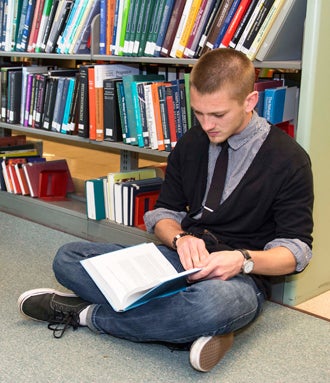M.A. in Education
Reading Specialization
Note to prospective applicants: The M.A. program with Reading Specialization is undergoing revision and is not currently accepting applicants. If you are interested in the program, please contact Terry Deeney for more information.
Overview

The graduate reading program prepares you to meet the International Literacy Association’s (ILA) Standards for Reading Professionals at the reading specialist/literacy coach level, and the requirements for Rhode Island certification as reading specialists/consultant.
Program Goals
This program is designed to teach you about the multifaceted aspects of literacy research and instruction. You will learn how to think critically about research and practice, base instructional decisions upon student needs, and understand student needs through more than one lens.
The program promotes a deeply held belief that teaching is reflective. Through reflection on theory, research, and practice, the program will enable you design appropriate literacy programs for all students, particularly students who struggle to achieve success in literacy learning.
Specific goals are to:
- Encourage reflection on literacy theory, research, and practice.
- Ensure that candidates have both historical and current knowledge of theory, research, and practice in the many and varied aspects of the reading process.
- Develop candidates’ expertise in understanding sources of reading difficulties, including reading disabilities and dyslexia.
- Foster candidates’ ability to assess the literacy needs of all students, to use these assessments to design and provide appropriate instruction for each student, and to interpret and present individual, school, and district-wide assessment data in various professional contexts.
- Help candidates use their knowledge of literacy and learning processes to develop creative, interactive, multi-sensory literacy instruction across all grade levels and content areas.
- Help candidates develop a repertoire of research-based instructional techniques appropriate to students who struggle with literacy.
- Expand candidates’ awareness of each learner as a distinct individual, and help them gain the instructional flexibility to support cognitive, socio-cultural, and linguistic diversity within the classroom and school.
- Guide candidates through experiences that develop expertise in working with colleagues and parents, and collaborating, coaching, and/or supervising teachers and paraprofessionals.
- Expand candidates’ ability to teach with technology and to teach students to use technology for accessing and presenting information.
